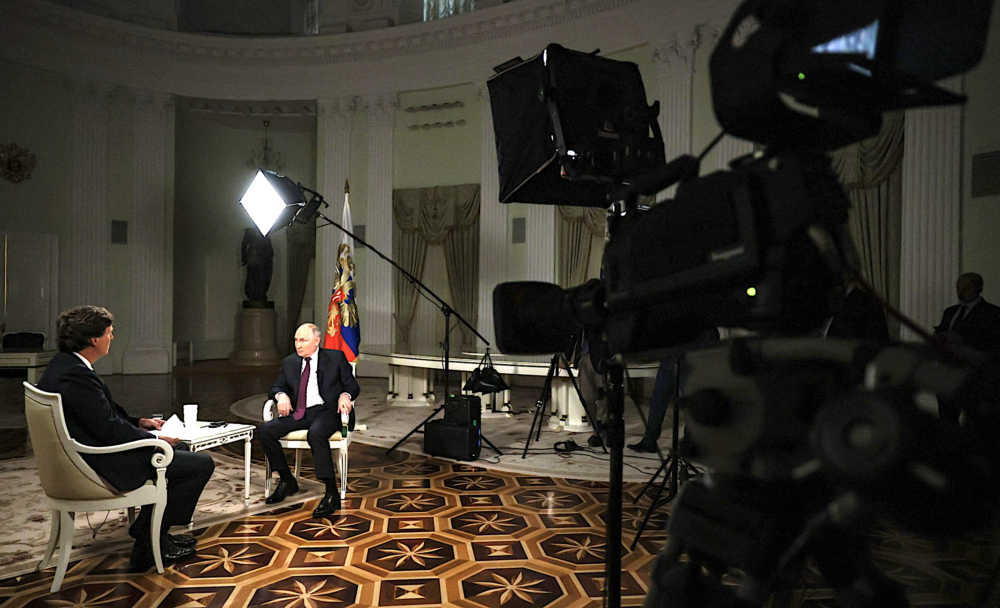Grand Delusions
NATO, 26 Feb 2024
Patrick Lawrence | Consortium News - TRANSCEND Media Service

NATO Secretary General Jens Stoltenberg and Germany’s Defense Minister Boris Pistorius on their way to Air Base Jagel in northern Germany, June 2023.
(NATO, Flickr, CC BY-NC-ND 2.0)
This year’s Munich Security Conference was predictably all about the imaginary danger that Russians intend to proceed westward into Europe as soon as they finish in Ukraine.
20 Feb 2024 – Let’s listen for a moment to Boris Pistorius, the German defense minister, in a mid–January interview he gave to Der Tagesspiegel, a small Berlin daily whose history dates to 1945, when the Allies set about democratizing the Nazi-era press in the capital’s western sector.
“We hear threats from the Kremlin almost every day, so we have to take into account that Vladimir Putin might even attack a NATO country one day,” Pistorius asserted with a display of confidence. “Our experts expect a period of five-to-eight years in which this could be possible.”
Where to begin with this liar.
No, neither the Germans nor anyone else in the West hears threats from “Vladimir Putin’s Russia,” as we must call the Russian Federation, either daily, weekly, monthly or in any other time frame you may choose. If you can manage to listen to the Russian president over the din of flabby-minded bureaucrats such as Pistorius, you hear quite the opposite.
To take a ready-to-hand case, here is Putin during that much-remarked interview he gave Tucker Carlson Feb. 6:
“… We have no interest in Poland, Latvia, or anywhere else. Why would we do that? We simply don’t have any interest. It’s just threat-mongering.”
Threat-mongering: good phrase. That is precisely and all Pistorius was trading in when he spoke to Der Tagesspiegel.
Pistorius’ apparent purpose was to raise the curtain on this year’s Munich Security Conference, held in the Bavarian capital last week. It was predictably all about the imaginary danger that Russians intend to proceed westward into Europe as soon as they finish in Ukraine, and Europe had better spend countless billions of additional euros on weaponry and make sure its unnatural alienation from Russia remains more or less permanent.
Jens Stoltenburg, Washington’s water-carrier as secretary-general of the North Atlantic Treaty Organization, now predicts that the crisis in East–West relations is likely to endure for decades. He actually improved on Pistorius’ “five-to-eight years.” In Munich, Stoltenburg got Putin’s threat to invade Western Europe down to three-to-five. He must consult different “experts.”
Get this, from a report published in the Sunday editions of The New York Times:
“As the leaders of the West gathered in Munich over the past three days, President Vladimir V. Putin had a message for them: Nothing they’ve done so far — sanctions, condemnation, attempted containment — would alter his intentions to disrupt the current world order.”
Say whaaa? What we see out our windows is a “world order?” Putin and the rest of the Moscow leadership have made their intentions clear too many times to count: It is to restore order to a world the Western alliance has led to the brink of an out-of- control chaos that has many non–Western nations, Russia high among them, near to quaking.
Let us draw the larger lesson here and then apply it elsewhere.
Detached From Reality

Stoltenberg addressing 60th Munich Security Conference on 17 Feb 2024
(Michaela Stache/MSC via Stenbocki maja, Flickr, CC BY-NC 2.0)
Those purporting to lead the collective West are now executing a set of aggressive foreign and military policies that are not short of dangerous for their distance from the true circumstances of our time. These policies are costly — in themselves and as measured in lost opportunity — economically and socially distorting, and, straight to the point, unmoored from reality.
There is no need to wonder what causes this departure from observable facts, diabolically purposeful as it often is, and what comes of it. This may seem an unprecedented moment in human history, but there are, indeed, many precedents.
Barbara Tuchman told us all about them in The March of Folly (Knopf, 1984): These grand lapses reflect an absence of intellect, vision, and principle at leadership level and lead ineluctably to failure and one or another kind of mess.
The Ukraine case, the preoccupation in Munich last week, could not possibly make this clearer.
Even The New York Times, in the same edition it repeated the Russian-threat-to-Europe bit, now reports — albeit elliptically, text and subtext — that Ukraine has either lost the war with Russia already or is in the process of doing so. Among the only people still unwilling to acknowledge this are those intent on shaking loose more money and matériel to send to the corrupt regime in Kiev — those in power in the West, this is to say.
[See: Throwing Good Money After Bad in Ukraine?]
Kiev is losing the war, but there cannot be any negotiations with “Putin’s Russia” because the Russian president — another incontrovertible lie — insists any settlement must be on his terms. So: more money, arms, and therefore lives, all wasted on a lost cause, but the door to talks that could end the conflict, suffering, and wastage must remain closed.
Deceptions & Self-Deceptions

Carlson interviewing Putin in Moscow on Feb. 6. (Kremlin)
This is how the West’s purported leaders insist on shaping the world we live in — a world based on deceptions and self-deceptions. This is what Tuchman meant by folly.
As Israel’s atrocities in Gaza continue daily, the delusions among the policy cliques in Washington and the European capitals are yet more grotesque.
In my previous column I considered the post–Gaza planning the policy cliques in Washington are currently running up the flagpole. Its three “tracks,” briefly enumerated, are the good old two-state solution providing for a separate Palestinian nation, formalized relations between Israel and Saudi Arabia — this the steel I–beam supporting Israel’s place in the region — and a renovated Palestinian Authority that will govern Gaza after Hamas is removed.
None of these propositions bears the slightest relationship with reality. Not one. They are all, please forgive me, masturbatory fantasies. But never mind: They are in the works as a new U.S. policy in West Asia.
Antony Blinken emerged from one of his multiple rounds of talks in Riyadh in mid–January to declare the Saudis had responded positively to his proposal for normalized relations with Israel. The Saudis wasted no time pushing a custard pie in Blinken’s face, making public a statement saying there is no chance of ties with Israel without just settlement of the Palestinian question.
 Let’s call this the march of folly in real time.
Let’s call this the march of folly in real time.
I thought further about those policy proposals after filing the above-linked commentary and recognized in them a subtext we must not miss: It is the working assumption that when Israel is done with its grotesqueries in Gaza the dust will settle, the region will come to forget, and all will return to some kind of normal.
This, it seems to me, is the greatest of all the delusions the Atlantic world’s policy circles now entertain and act upon.
There is no chance — does this go without saying? — that Israel, the Palestinians, or West Asia will return to any kind of status quo ante once Israel disperses those Palestinians in Gaza it has not murdered.
Israel is already down as a pariah state. If it were South Africa I would say it is the early 1980s on history’s clock, 15 years or so before the apartheid regime gave up the ghost.
As is well-known, loyalty to the Palestinian cause had faded among Arab nations and further abroad prior to the events of Oct. 7. Now the world is again paying attention, as South Africa and the International Court of Justice announced last month. As the Saudis just signaled, the fate of Palestinians — and of Israel, and of the U.S position in the Middle East — are bound together now.
The Biden regime, epicenter of the West’s delusional foreign policies, especially those concerning the non–West, has permanently altered its position in West Asia. Overexposed on the ground, it is likely to find itself more vulnerable than it has been for the past eight decades and more suspect on the diplomatic side even among those nations it has traditionally counted friends.
Policy unrooted in reality cannot address the challenges or crises of its time. Those who shape it, having no capacity to address such pressing circumstances, are on their march to folly.
What do you give it before the consequences of the West’s delusions — in Ukraine and in relations with Russia; in the Middle East — become evident? Five to eight years? Or three to five?
______________________________________________
 Patrick Lawrence, a correspondent abroad for many years, chiefly for the International Herald Tribune, is a columnist, essayist, author and lecturer. His most recent book is Time No Longer: Americans after the American Century. His Twitter account, @thefloutist, has been permanently censored. His website: Patrick Lawrence
Patrick Lawrence, a correspondent abroad for many years, chiefly for the International Herald Tribune, is a columnist, essayist, author and lecturer. His most recent book is Time No Longer: Americans after the American Century. His Twitter account, @thefloutist, has been permanently censored. His website: Patrick Lawrence
Go to Original – consortiumnews.com
Tags: European Union, Germany, Military, NATO, Official Lies and Narratives, Russia, Ukraine
DISCLAIMER: The statements, views and opinions expressed in pieces republished here are solely those of the authors and do not necessarily represent those of TMS. In accordance with title 17 U.S.C. section 107, this material is distributed without profit to those who have expressed a prior interest in receiving the included information for research and educational purposes. TMS has no affiliation whatsoever with the originator of this article nor is TMS endorsed or sponsored by the originator. “GO TO ORIGINAL” links are provided as a convenience to our readers and allow for verification of authenticity. However, as originating pages are often updated by their originating host sites, the versions posted may not match the versions our readers view when clicking the “GO TO ORIGINAL” links. This site contains copyrighted material the use of which has not always been specifically authorized by the copyright owner. We are making such material available in our efforts to advance understanding of environmental, political, human rights, economic, democracy, scientific, and social justice issues, etc. We believe this constitutes a ‘fair use’ of any such copyrighted material as provided for in section 107 of the US Copyright Law. In accordance with Title 17 U.S.C. Section 107, the material on this site is distributed without profit to those who have expressed a prior interest in receiving the included information for research and educational purposes. For more information go to: http://www.law.cornell.edu/uscode/17/107.shtml. If you wish to use copyrighted material from this site for purposes of your own that go beyond ‘fair use’, you must obtain permission from the copyright owner.